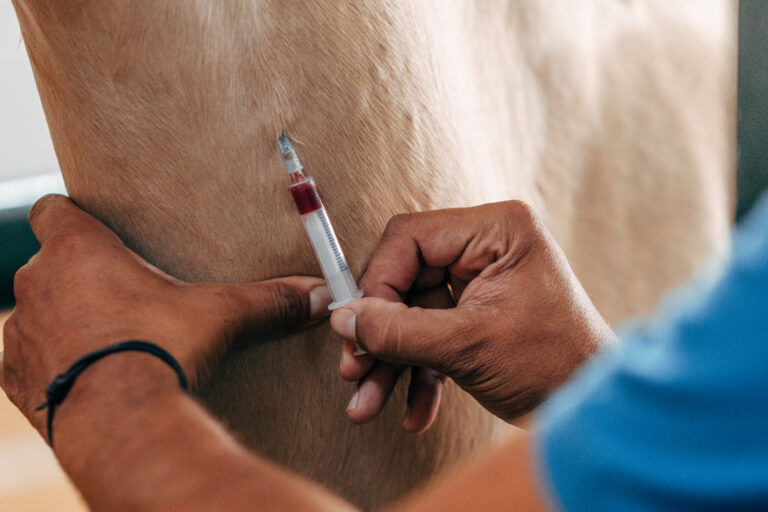 Credit: John Eisele/CSU Patrick Succo, a CSU veterinary student, was inspired to pursue veterinary medicine while attending Monument Valley High School in Kayenta, Ariz., where he is now helping to launch a new partnership.
Credit: John Eisele/CSU Patrick Succo, a CSU veterinary student, was inspired to pursue veterinary medicine while attending Monument Valley High School in Kayenta, Ariz., where he is now helping to launch a new partnership.Colorado State University veterinary students on Monday began essential animal-care instruction for high school students in the Navajo Nation, equipping teenagers with basic veterinary skills in a region dependent on livestock production, while also encouraging the teens to pursue college educations.
In another part of the newly launched project, starting in August, the CSU Doctor of Veterinary Medicine Program will provide week-long surgical clinics for pets, horses and livestock in the Monument Valley region of the Navajo Nation. The area in northern Arizona depends on agriculture and is in dire need of veterinary services.
The two-pronged project is largely prompted by Navajo veterinary student Patrick Succo, 26, who grew up in Ts’ah bii Kin, or “House in the Sagebrush,” and was inspired a decade ago to pursue veterinary medicine in a program very much like the one he’s now leading–and in the very same place.
“Veterinary medicine is what I really want to do, and that’s where it all started,” said Succo, entering his second year in Colorado State’s DVM Program. “I’m hoping the high school students attending our workshops will gain the motivation to pursue higher education like I did.”
Outreach Based at Center in Kayenta
The veterinary outreach project is based at the nationally acclaimed Agri-Science Center at Monument Valley High School in Kayenta, Arizona, and it is designed to benefit high schoolers, livestock producers, pet owners and a plethora of animals in Navajo country–while also boosting medical skills and cultural competency among Colorado State veterinary students. CSU vet students will conduct workshops during annual veterinary summer camps for high schoolers and also will perform surgeries with guidance from the university’s veterinary faculty during regularly scheduled clinics.
The clinics, expected to eventually number several per year, will be offered as elective practicums for CSU veterinary students interested in treating pets, horses and livestock in rural communities. The first CSU surgical clinic in Kayenta will be August 1-6.
Sixty high school students are attending the veterinary summer camp June 6-10 at Monument Valley High School. Succo, along with CSU veterinary students Jake Rodgers and Megan Kelley, are providing camp sessions about pet, equine and livestock vaccinations, parasitology, infectious disease, physical exams, wound care, surgical preparation and dental care. Some sessions will focus on cattle, sheep and horses, which are central to agricultural life and livelihoods in Navajo country.
Connection to High Schoolers is Unique
Many veterinary schools provide spay-neuter and other medical clinics in under-served areas, including tribal lands. Yet CSU’s newly established collaboration with Monument Valley High School is notable for its plan to help students studying vocational agriculture through the school’s sophisticated Agri-Science Center, while also meeting veterinary needs in the Navajo community and providing skills development for CSU veterinary students.
“It’s a match made in heaven,” said Dr. Melinda Frye, a veterinarian and CSU associate dean for veterinary academic and student affairs. “When Patrick told me about this opportunity, it seemed almost too good to be true because it’s such a win-win. It was even more exciting to visit the Agri-Science Center at Monument Valley High School and imagine how this collaboration could look.”
The Agri-Science Center, completed in 2011, is the brainchild of Clyde McBride, who teaches vocational agriculture and veterinary science at Monument Valley. He convinced his tiny school district in Navajo country to construct the $2.4 million, 22,000-square-foot facility to teach high schoolers practical veterinary skills and to provide the community with a fully functional veterinary clinic, including classrooms, treatment areas, specialized livestock-handling equipment, and surgical suites for large and small animals.
McBride received the 2015 National Teacher of the Year Award from the Association for Career and Technical Education. A story in TIME magazine, headlined “Learning That Works,” described McBride’s approach to teaching agricultural science for Navajo high-schoolers. “These kids are thirsty,” McBride says in the TIME story. “All you’ve got to do is let them drink.”
Student Returns to Inspirational Program
Succo was one of his students. His interest in veterinary medicine sparked when Succo was 16 years old and a member of the Monument Valley FFA chapter under McBride’s tutelage. Succo had grown up raising horses, cattle, sheep and hay with his family; the career light clicked on when Mr. McBride brought in professional veterinarians for a clinic, and the teenager helped prep animals for surgery.
McBride recently arranged for an in-house veterinarian to help fulfill teaching and clinical needs at the Agri-Science Center. Those plans fell through, and Succo lobbied for a partnership between his former high school and the Colorado State DVM Program.
Now Succo is back home, teaching Navajo high schoolers to determine correct vaccine dosage for horses and how to file down sharp points on their molars.
“I want to get students thinking about college and pursuing a career in something they’re passionate about,” said Succo, who studied chemistry and molecular biology at Fort Lewis College in Durango, Colorado, before starting veterinary school at CSU. “It’s so great knowing that we will be helping to save lives and bringing knowledge to the community.”
Clyde McBride, head of vocational agriculture and veterinary science at Monument Valley High School in Kayenta, Arizona, describes his education program in a video produced by the Association for Career and Technical Education. Members of the Monument Valley FFA Chapter offer their perspectives in another video.








